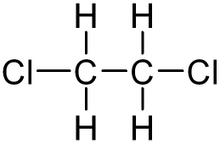Difference between revisions of "1,2-Dichloroethane"
| Line 7: | Line 7: | ||
===Physical=== | ===Physical=== | ||
| − | Ethylene dichloride is colorless and has a high index of refraction, giving it a shiny appearance, similar to chloroform, which it also smells | + | Ethylene dichloride is colorless and has a high index of refraction, giving it a shiny appearance, similar to chloroform, which it also shares a similar smells. It is a versatile solvent, though it does form [[Azeotrope|azeotropes]] with water and many other solvents. |
==Availability== | ==Availability== | ||
Revision as of 18:38, 1 March 2016
1,2-dichloroethane, or ethylene dichloride, is a common solvent and reagent, going by the abbreviations EDC and 1,2-DCA. It is also used to make vinyl chloride, the major precursor to polyvinyl chloride, commonly known as PVC.
Contents
Properties
Chemical
Ethylene dichloride is a slightly reactive polar solvent. It is sometimes used as a precursor to ethylenediamine and 1,1,1-trichloroethane[1].
Physical
Ethylene dichloride is colorless and has a high index of refraction, giving it a shiny appearance, similar to chloroform, which it also shares a similar smells. It is a versatile solvent, though it does form azeotropes with water and many other solvents.
Availability
1,2-Dichloroethane is mostly bought from chemical suppliers rather than ordinary retail stores due to its inherent dangers. In some countries, however, it is sold in hobby stores with no questions asked as a solvent for fusing plastic parts to each other.
Preparation
1,2-Dichloroethane can be prepared by bubbling chlorine through ethene solution (Eg. dissolved in carbon tetrachloride) with a iron(III) chloride catalyst, or bubbling oxygen through a solution of 1 molar part ethene to four molar parts Hydrochloric acid with a copper(II) chloride catalyst. The first procedure produces pure 1,2-dichloroethane, while the second results in water as well[2].
Projects
- Ethylenediamine synthesis
- Make PVC
Handling
Safety
Ethylene dichloride is toxic (by inhalation), flammable, and a carcinogen. All these hazards are amplified by the chemical's volatile nature. This chemical is also unstable when in the presence of aluminium, zinc, and iron[3].
Storage
Dichloroethane should be stored in closed bottles in dark well ventilated places.
Disposal
Dichloroethane can be neutralized with a strong alkali solution or with Fenton's reagent.
References
- ↑ http://en.wikipedia.org/wiki/1,2-Dichloroethane
- ↑ http://en.wikipedia.org/wiki/1,2-Dichloroethane
- ↑ http://en.wikipedia.org/wiki/1,2-Dichloroethane
